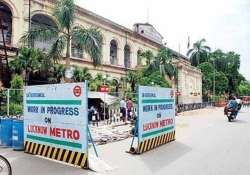Lucknow to have its own Metro
Lucknow: The Uttar Pradesh government on Tuesday approved the revised Detailed Project Report (DPR) submitted by Delhi Metro Rail Corporation for the proposed Lucknow metro rail project.The decision was taken at a cabinet meeting, chaired

Lucknow: The Uttar Pradesh government on Tuesday approved the revised Detailed Project Report (DPR) submitted by Delhi Metro Rail Corporation for the proposed Lucknow metro rail project.
The decision was taken at a cabinet meeting, chaired by Chief Minister Akhilesh Yadav. The chief minister was authorised to consult the Centre on the DPR and make amendments and changes in the future.
The cabinet decided to implement north-south corridor from airport to Munsi Pullia on priority basis in the first phase, a UP government spokesman said.
The chief minister was also authorised to take decision on practical problems faced in the implementation of the proposed north-south corridor.
An estimated 6.45 lakh passengers will use this corridor in the year 2020, the 'peak hour peak direction traffic (PHPDT)' of this corridor is estimated to be 20,976 in 2020.
The metro service is expected to start operations in December 2016.
The constitution of the Lucknow Metro Rail Corporation (LMRC) is underway with the memorandum of association and articles of association having been prepared.
DMRC is working on the depot design for north-south corridor, which is proposed to be developed in the first phase, he said.
The underground portion of north-south corridor was reduced from 7.5 km to approximately 3.5 km from Charbagh to Hazratganj, he said adding that 22 stations are proposed in the first phase, out of which three stations are underground and 19 stations elevated, he said.
One rake would consist of six coaches with a passenger strength of 1,574. Initially, the train will run at an interval of 7 to 14 minutes but with the increase in traffic the interval will be reduced to 2 to 4 minutes.
The completion cost of the first phase of the project is estimated at Rs 6,757 crores.
All possible efforts are being made to obtain necessary approvals and financial sanction from the Centre as these are mandatory to start actual construction on this corridor by the target date of December 2013, a senior officer
The decision was taken at a cabinet meeting, chaired by Chief Minister Akhilesh Yadav. The chief minister was authorised to consult the Centre on the DPR and make amendments and changes in the future.
The cabinet decided to implement north-south corridor from airport to Munsi Pullia on priority basis in the first phase, a UP government spokesman said.
The chief minister was also authorised to take decision on practical problems faced in the implementation of the proposed north-south corridor.
An estimated 6.45 lakh passengers will use this corridor in the year 2020, the 'peak hour peak direction traffic (PHPDT)' of this corridor is estimated to be 20,976 in 2020.
The metro service is expected to start operations in December 2016.
The constitution of the Lucknow Metro Rail Corporation (LMRC) is underway with the memorandum of association and articles of association having been prepared.
DMRC is working on the depot design for north-south corridor, which is proposed to be developed in the first phase, he said.
The underground portion of north-south corridor was reduced from 7.5 km to approximately 3.5 km from Charbagh to Hazratganj, he said adding that 22 stations are proposed in the first phase, out of which three stations are underground and 19 stations elevated, he said.
One rake would consist of six coaches with a passenger strength of 1,574. Initially, the train will run at an interval of 7 to 14 minutes but with the increase in traffic the interval will be reduced to 2 to 4 minutes.
The completion cost of the first phase of the project is estimated at Rs 6,757 crores.
All possible efforts are being made to obtain necessary approvals and financial sanction from the Centre as these are mandatory to start actual construction on this corridor by the target date of December 2013, a senior officer